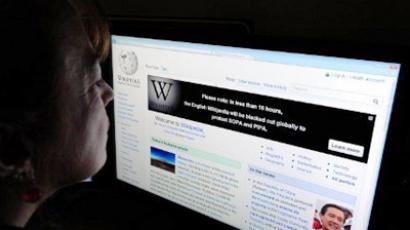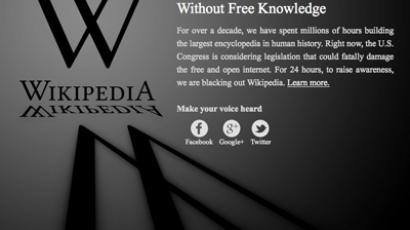‘BoingBoing’ editor: SOPA bill ‘badly written and open to abuse'
Rob Beschizza has told RT that the Stop Piracy Online and Protect IP Acts will not, in fact, stop piracy or protect anything – but they will damage the very founding ideals of the world wide web.
Beschizza, who is a managing editor at award-winning creative weblog BoingBoing.net, said the only way to make sure piracy is stopped is to talk about legislative ways and means with the technical community, instead of it being rushed through by the media business. “Laws should target -carefully- specific criminal acts and avoid some of the kind of draconian Internet–breaking measures that these laws in the United States outline.”BoingBoing.net is one of the many sites voluntarily going dark for 24 hours – alongside others like Wikipedia, Mozilla, Reddit, WordPress and more. The web-wide protest is an unprecedented move for a relatively young, relatively disorganized and decidedly unpolitical industry that has until now preferred the virtual world to Capitol Hill. The brothers in virtual arms are up against some serious heavyweights, too. The Motion Pictures Association of America and the US Chamber of Commerce have both thrown their very considerable weight behind SOPA and PIPA. The latter is one of the biggest lobbying forces on the Hill, and could theoretically sway Congressional debate on its own. The biggest problem with that, according to industry people like Beschizza, is that this isn’t the first time an aggressive law has been introduced – and it hasn’t had the effect lawmakers claimed it would. “In all the years of these laws and aggressive litigation from the industry, none of it has ever had the slightest impact on piracy. So there’s no reason to think that pirates wouldn’t be able to find a way around it this time as well. But there would be still be all these new legal mechanisms ready to be abused, so where is the benefit, for anyone?!"This sentiment is echoed by most in the industry who are very concerned with the potential damage SOPA and PIPA could cause. Andrew McDiarmid, policy analyst for the Centre for Democracy and Technology, told RT that the Internet has become an important outlet for many of those who need their work protected – artists, musicians, writers and so on. But the proposed measures wouldn't protect them as much as they would harm them. "There is room for a law that takes careful targeted action at those website that make a business of infringement", McDiarmid said. "But I also recognize that the Internet is a key factor in how artists today are distributing their work and reaching their fans, and we don't want to throw that out with measures to crack down on the actual bad guys".














